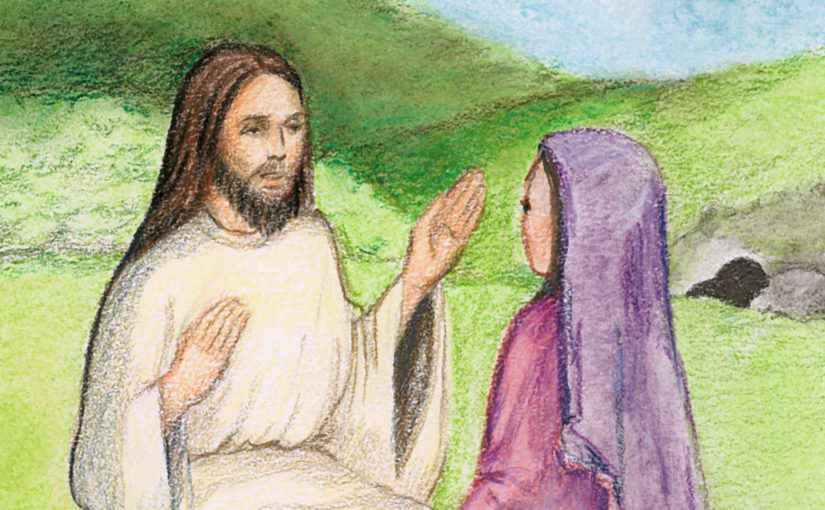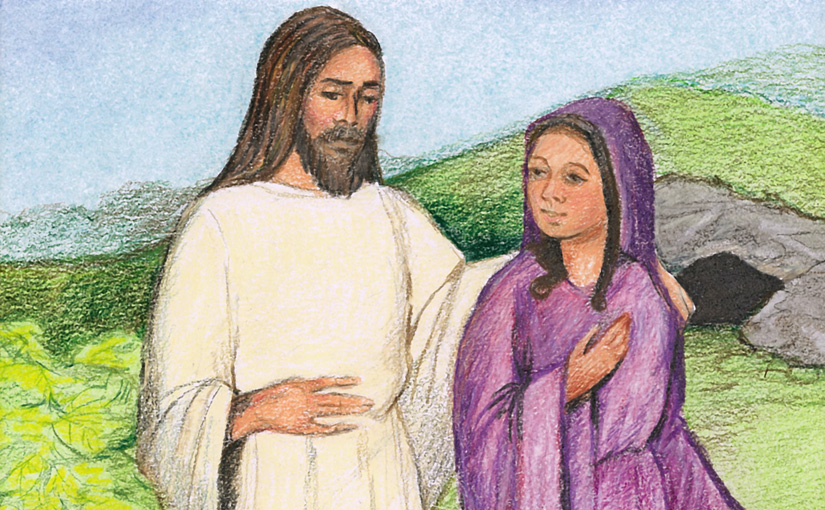Methods for Teaching the Beatitudes
Matthew 5:12-80
Part 1
When teachers meet to plan the teaching methods to use for teaching the Beatitudes, they will study three methods: bible study, self-testing and song. By combining these teaching methods when teaching the Beatitudes, they create a powerful tool for nurturing their students’ spiritual growth.
BEATITUDES: TEACHERS LESSON PLAN
I. Overview of steps in the Teachers’ Planning Meeting
A. Distribute copies of Part I, METHODS FOR TEACHING THE BEATITUDES. Four inserts are titled, Comment on Method.
B. Distribute Part I and materials listed in Part II, BEATITUDES: MATERIALS FOR TEACHING, for each teacher.
C. Read the story, Jesus Teaches the Beatitudes, in Part I.
D. Study each Beatitude.
E. Take the Self-Test
F. Sing, Blest Are They, by David Haas
II. Go through the lesson.
A. Begin with the story.
JESUS TEACHES THE BEATITUDES
Early one morning over 2000 years ago in the hill country of Palestine a young rabbi named Jesus lingered over his last breakfast with his mother, Mary. Finally, he stood and softly said, “Goodbye.” His time in Nazareth was over.
As he walked away, he looked back and waved one more time.
He was bound for Capernaum, a distant town on the shore of the Sea of Galilee. The two-day journey across the hills was hard but the beautiful scenery made it quite pleasant. When the town came into view, he felt a surge of excitement. This was the place where he would begin his public ministry.
After he reached the center of Capernaum, he spent a long time wandering among the shoppers, getting to feel comfortable with them. Most people seemed poor. Some were farmers, others were fishermen, bakers or tailors. Everyone was tense because they feared the grim Roman soldiers patrolling the streets.
GOOD NEWS
For several months, Jesus worked near the seashore, preaching to small groups of people and healing the sick. Slowly, he taught them that God’s love was breaking into their lives in a new and more powerful way. Their spirits soared at this news and they spread the word to all their friends. The crowd grew larger each day. Four young fishermen were especially excited by his good news. So, Jesus called to them and asked them to help him tend to the needs of the people. These were his first disciples: Peter, Andrew, James and John. Soon there were a few more.
Late one afternoon, after the crowd left, Jesus led his disciples to the top of a nearby mountain. There he asked them to sit for a while and
listen. Since the disciples really liked the sound of his voice and his kind words, they paid close attention.
He invited them to join him in a new way of living, a way that offered great happiness. He surprised them by adding eight new Laws to the old Law. He called them, the Beatitudes. They were not strict laws engraved on stone like the 10 Commandments. They were attitudes written in their hearts that inspired loving actions.
THE BLESSING
To explain their importance, he said, “Whenever your action is inspired by a Beatitude, God’s love flows through you to the other person. Then, as this is happening, you are blessed with the feeling of happiness. You feel God’s pleasure.
A low murmur rumbled through the group of disciples as they reacted to Jesus’ message. They had assumed that wealth brought happiness. But Jesus now said, whether you were rich or poor, it was not wealth but sharing God’s Love that brought happiness. They would need to think about that for a while.
Seated there on the ground, listening to Jesus teach, the disciples did not realize that he was preparing them to carry the message of the Beatitudes to the whole world.
STUDY THE METHODS
Comment on Method
We begin teaching the Beatitudes with a story because God designed the human brain to learn best from stories. When students read the tale of the day Jesus taught the Beatitudes to his disciples, they are quickly drawn into the world of ancient Palestine. In their imaginations, they enter the scene. They see the mountainside. They see the people by the seashore. They hear Jesus speak.
The next stories are stories told by Jesus. They ease students into many of the scenes from that long-ago time. The actions of the people within them help students understand the Beatitudes. After studying these biblical examples, it is the task of the teacher to show how the Beatitudes can add joy and comfort to their lives, today. XXX
B. Teach each Beatitude.
Each of the eight Beatitudes has two parts. The first part names an attitude and the second part describes the blessing (happiness) it gives.
Poor in Spirit
1. Happy are the poor in spirit, for theirs is the Kingdom of God.
Definition
Poor in spirit means humble and willing to receive. These people are good listeners, interested in hearing the opinions and stories of others.
The blessing, “For theirs is the Kingdom of God,” means that God rules their hearts. Their joys increase as they become more receptive to what others have to give. The Kingdom of God is a lifestyle, not a place.
Read Mark 10:17-25
The Rich Young Man
Discussion Questions
Try to explain the rich young man’s decision. Do you agree or disagree with Jesus’ advice? Should everyone give their wealth away?
Comment on Method
Teachers ask questions because questions are like an alarm clock. They awaken the class and focus its attention. This method forces students to struggle with the issues.
Teacher’s Summary
Jesus taught that happiness comes, not from material wealth, but from warm, personal friendships. Even though the rich man felt empty, he valued his wealth more than the friendship Jesus offered. Most likely, he will never be happy.
Those who do value love over wealth need not give all their wealth away. Many of Jesus’ followers were wealthy people who shared their wealth. See, Luke 8:3. Also, Mary, Martha and Joseph of Arimathea were wealthy followers. Wealth is bad for a person if being rich is the purpose of his or her life.
Those Who Mourn
2. Happy are those who mourn (with another). They shall be comforted.
Definition
A Good Samaritan is one who gives comfort to someone who has lost something important to him or her. Loss can result from a death, a friend moving away, failure in school, work or sports. People also mourn loss of health or theft of a treasured object.
The blessing, means that the comforter feels God’s pleasure when he aids or consoles an injured person.
Read Luke 10:30-37
The Good Samaritan
Discussion Questions
Describe a time when you felt good about helping someone. Was that feeling a sign of God’s pleasure?
Teacher’s Summary
In this story, the Good Samaritan mourns for the victim, gives comfort and feels happy that he could help. Since this lesson needs little explanation, ask students to describe more ways that people can give comfort. A visit or phone call. A kind word. An offer to help.
The Gentle
3. Happy are the gentle, they shall inherit the earth.
Definition
The gentle seek the softest way to resist unfair treatment. Then, they give the Holy Spirit time to work. They never speak with intent to hurt.
The blessing, “inherit the earth,” means, things often go their way. Probably because they do not build walls between themselves and others.
Read Luke 22:24-27
Who is the Greatest?
Discussion Questions
Do you know anyone, real or in fiction, who thinks he or she is better than others?
Teacher’s Summary
It is very difficult for talented people to be humble. People can be pleased with their talents as long as they understand that they have been given their talents to enrich the life of others. In this way they serve God, not themselves.
Those Who Thirst for What Is Right
4. Happy are those who thirst for what is right. They shall be satisfied.
Definition
These folks are honest in word and deed. They see and accept reality. They admit their mistakes. They enjoy praise for doing well.
The blessing, “They shall be satisfied,” means that they feel content because they did their best. Results are in the hands of God.
Read Luke 16:19-31
The Rich Man and Lazarus
Discussion Question
Since the rich man often passed by the beggar at his gate, why do you suppose he failed to stop and give him something?
Teacher’s Summary
Jesus’ example for this Beatitude describes a man who failed to practice it. The rich man did not want to see a person in need. Perhaps he distracted himself with thoughts of lunch with a friend or plans for a shopping trip. His self-centered thoughts caused him to be spiritually blind.
The Merciful
5. Happy are the merciful, they shall receive mercy.
Definition
The merciful are kind, generous and understanding. They avoid harsh judgements. They accept apologies. They give people more than they deserve.
The blessing, “They shall receive mercy,” means that kindness begets kindness.
Read Luke 15:11-32
The Lost Son
Discussion Question
Why did the Father rebuke the elder son? Was the father fair?
Teacher’s Summary
In this parable, the Father stands for God. It tells us how God judges people who fail to be merciful. The father rebuked the elder son because he was self-righteous. Had he shared his father’s joy, he would have been treated kindly.
(The Pure of Heart)
6. Happy are the pure of heart, for they shall see God.
Definition
The pure of heart are those with good motives. They do not lie or try to manipulate others.
The blessing, “They shall see God,” means they feel God’s presence.
Read Matthew 20:20-21, 24-28
(The Mother of James and John)
Discussion Question
Why was Jesus so upset with the mother’s request?
Teacher’s Summary
Jesus, sternly denied the mother’s request because she was a manipulator. He wanted no power grabs among his people. He taught them to use power only to serve the good of others.
(The Peacemakers)
7. Happy are the peacemakers, they shall be called Sons of God.
Definition
Peacemakers accept disagreements as normal. Peaceful, describes the way they resolve them. Mutual respect and the desire to listen to another point of view are the top values.
The blessing, “They shall be called Sons of God,” means that others see them as God’s instruments.
Read Colossians 3:18-21
(The Christian Family and Anger)
Discussion questions
What do some people do when they are angry? How do you feel when someone calls you a nasty name? Why is name-calling wrong?
Teacher’s Summary
When we are angry, we tend to use strong words that make things worse. So, Paul taught his people a guideline for resolving conflicts. It began with the word, submit. In ancient Greek this word meant, to listen. Paul urged people to listen to each other when they were angry. Name-calling or other attack words trigger counter attacks, not peace.
(Those Who Are Persecuted)
8. Happy are those who are persecuted in a cause that is just, for theirs is the Kingdom of God.
Definition
The persecuted have the courage to endure ongoing harm. They risk their popularity in order to resist a wrong.
The blessing, “For theirs is the Kingdom of God,” means they do not suffer alone. God is in their hearts. He walks with them and he talks with them.
Read Mark 3:1-6
(A Sabbath Cure)
Discussion Question
Were you surprised when the Pharisees wanted to destroy Jesus after he performed a good deed?
Teacher’s Summary
The Jews believed that it was a sin to work on the Sabbath. And, healing was work. But, Jesus wanted to teach people that sometimes mercy was more important than blind obedience to law. Even though he knew it was dangerous, Jesus healed a man on a Sabbath.
But the Pharisees could not accept this. They feared Jesus’ disobedience to the law would cause God to punish the nation. For this reason, they wanted him executed.
9. Apply the lessons of the Beatitudes to ourselves.
The Self-Test
A. Ask the students to take the Self-Test. Assure them that the test is for their eyes only.
Discussion Questions
After the students have finished the test, ask: Which is the hardest/easiest Beatitude to practice?
Teacher’s Summary
Learning to live according to the Beatitudes is a life-long task. The Self-Test is a tool students can use to monitor their spiritual growth. Ask them to save the Self-Test and review it every few months.
Comment on Method
Taking a self-test is a method for teaching one’s self. It invites and enables private, personal reflection.
B. Conclude the lesson.
Sing a Hymn
Distribute lyrics for a CD sing-a-long. Play, Blest are They, by David Haas.
Comment on Method
This lesson uses three teaching methods. The first two, bible study and the self-test, educate the mind. The third method, singing, educates the emotions. This is good because the more pathways to the brain teachers use when teaching a lesson, the better the students retain it.
Each time students sing this hymn in church the lessons of the Beatitudes will come alive for them. When they sing the refrain, “Rejoice and be glad. Yours is the Kingdom of God,” they will feel joy in the Lord. You might ask the choir director to include this song in the worship service every so often. XXX
This lesson on the Beatitudes is best used for junior high through adult classes. It may require more than one class.
Key Words
35… Teach
24… Beatitudes
14 … Methods
18… Transitional words or phrases
Part 2 of Jean Furgal’s Beatitudes lessons for the teacher trainer will be published here shortly. Thank you for reading.



